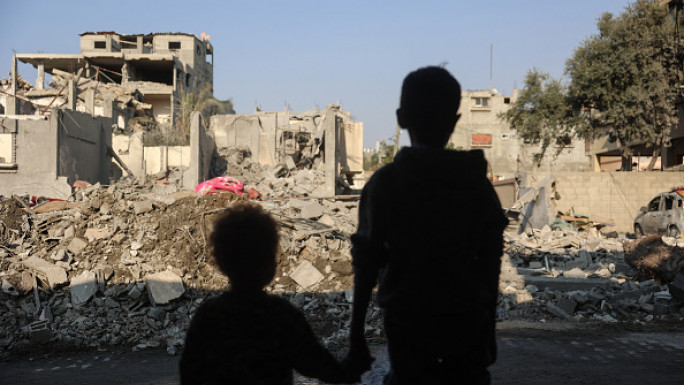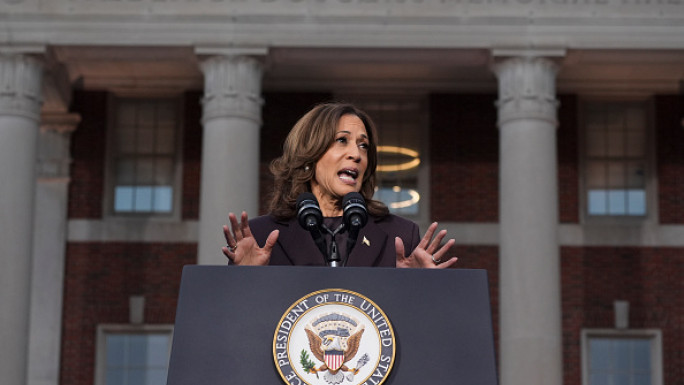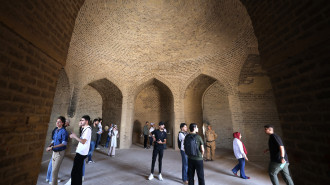Yousef Munayyer: 'Palestine activism will continue to grow in the US'
This comes despite Joe Biden, the firmly establishment Democratic challenger to President Trump, comfortably defeating his progressive rival Bernie Sanders in the primaries earlier this year.
But it seems to Munayyer, and many others on the left, that Sanders' groundbreaking primary campaigns in both 2016 and 2020 sparked a growing appetite for a break with the status quo, and set in motion a sea change in attitudes towards social justice at home and abroad that is set to prevail for the foreseeable future.
Through his tireless advocacy and scholarly credentials, Munayyer has inserted himself as one of the most compelling, coherent and deservedly recognisable voices on the issue of Palestine in the US, where the conditions of debate are often openly hostile, as Munayyer himself has experienced at the hands of Fox News.
Born in Lod and raised in New Jersey, Munayyer is now a non-resident Senior Fellow at Arab Center Washington DC after directing the US Campaign for Palestinian Rights for several years. As well as boasting a 60,000 strong Twitter following, he is a familiar guest and columnist in television and print discussions of Palestine, both in the US and internationally.
 |
It is hard to say you stand for democracy and equality, for example, and support a perpetually undemocratic and unequal system |  |
The general change he speaks of is markedly reflected in attitudes to the issue of Palestine, which have long been stuck in the stagnant rhetoric of a two-state solution despite the steady erosion of Palestinian rights and land.
These attitudes are likely to further shift towards the progressive end of the spectrum, "because of core values Americans claim to aspire to," says Munayyer. "It is hard to say you stand for democracy and equality, for example, and support a perpetually undemocratic and unequal system."
Progressives, he says, "will be at the forefront of challenging this contradiction in the years to come, expanding support for Palestinian rights into the political mainstream."
A shift in American interests in the region, which have long shaped US policy towards Israel, will coincide with this shift in attitudes, "primarily, the declining dependability on the region's natural resources and the American public's fatigue over drawn out military engagement there."
Twitter Post
|
However, Munayyer downplays the strong pushbacks to this shift, notably attempts from the right to ban BDS, and the Trump administration's bid to label organisations such as Amnesty International anti-Semitic for documenting Israeli human rights abuses. Instead, he remains hopeful.
"Pro-Israel efforts to silence speech might have limited success but [they] are also desperation moves," he says. "Not only do they come up against the first amendment but they underscore how their side would rather avoid the debate all together than try to win it."
"The heavy handedness of such measures, when properly exposed, are likely to turn more people away from supporting Israeli policy than the other way around," he adds, reassured that Palestine activism will continue to grow in the US, "propelled by the situation on the ground in Palestine but also enabled by progressive coalition building."
But on the immediate future of US policy for Palestinians, patience is required. If Biden does succeed in entering the White House, finding a solution to the Israel-Palestine conflict is a far-off priority, given the current circumstances.
"Should a Biden administration come into office in January of 2021, they will be trying to address a nation suffering under a global pandemic, an economy in tatters, and possibly a government on the brink of political crisis. That's just the home front," says Munayyer.
"When it comes to foreign affairs, a Biden administration will likely prioritise resetting a plethora of relationships that have been impacted by the Trump years, including but not limited to those with NATO allies, Russia, China, international organisations, Iran, Saudi Arabia and so on. Even without these priorities taking precedence, the Israeli-Palestinian issue is not one a politician like Biden would normally be inclined to invest in heavily," he adds.
With Palestine at the bottom of the pile, Biden's engagement will be "superficial at best", likely limited to minor roll-backs of some of the Trump administration's small-scale policy changes. In short, no one should hope that the normalisation agreements or recognition of Israel’s capital as Jerusalem will be voided.
 |
It is wrong to think any vote for president in the near term is a vote to free Palestine. The reality is the politics here have not reached that stage |  |
"It is wrong to think any vote for president in the near term is a vote to free Palestine," says Munayyer. "The reality is the politics here have not reached that stage. It seems to me then that the choice for voters who care about that outcome in the interim is about how to best help create the conditions for that possibility in the future."
Coming back to next week's election, most Americans will cast their votes on policies that fall within their borders, not in continents thousands of miles away. But Munayyer adds that seeing domestic and foreign policies as interconnected gives more clarity to the situation in which America currently finds itself.
"In the globalised world we live in it is increasingly difficult to really separate foreign and domestic issues," he says. "How can we talk about climate change without talking about fossil fuel procurement? How can we talk about economic inequality without discussing the excesses of global capitalism? How can we talk about the threats to our rights and liberties at home without talking about global authoritarianism?" he asks.
"Moving forward, the most successful and perceptive analysis of politics, in my view, is one that understands the intersections between the foreign and the domestic since it best characterises the world we live in today."
Florence Dixon is a journalist at The New Arab.
Follow her on Twitter: @flo_dix
Read more from The New Arab Meets special section below:
 |
|


![President Pezeshkian has denounced Israel's attacks on Lebanon [Getty]](/sites/default/files/styles/image_684x385/public/2173482924.jpeg?h=a5f2f23a&itok=q3evVtko)



 Follow the Middle East's top stories in English at The New Arab on Google News
Follow the Middle East's top stories in English at The New Arab on Google News


